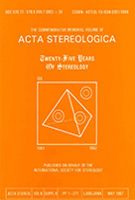Morphometric alterations in the lung induced by inhaled bacterial endotoxin
Abstract
Using lipopolysaccharide (LPS) derived from a bacterium found in cotton and cotton mill dust, aqueous aerosols (4 μg/m3) were used to expose randomly selected hamsters to a 5 h aerosol of either saline or LPS. Additionally, groups received an i.p. injection of either LPS, to render them endotoxin tolerant, or cobra venom factor, for purposes of inactivating complement in vivo, prior to aerosol exposure. Quantitatively, septal capillary blood space showed increased VV of polymorphonuclear leukocytes (PMNs) and platelets, decreased lung volume and increased NV of endothelial pinocytotic vesicles following LPS inhalation. Prior tolerization abolished PMN and platelet recruitment while decomplementation abolished cell recruitment and changes in lung volume. Neither treatment abolished the increased pinocytotic vesicle NV. These results implicate certain chemical mediators as being important in the response to inhaled LPS and demonstrate the effectiveness of using these techniques to gain a better understanding of the pathogenesis of disease.

